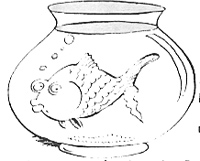 One of the more interesting ways to enliven a game is through the use of misinformation. There is a difference between misinformation and outright lying and sometimes the line between them is subtle, but if properly played, it can make an interesting game.
One of the more interesting ways to enliven a game is through the use of misinformation. There is a difference between misinformation and outright lying and sometimes the line between them is subtle, but if properly played, it can make an interesting game.
One of the more interesting bits of misinformation that I have seen is done by Frank Chadwick with his rules COMMAND DECISION. Frank makes up a play sheet for each game which lists the abilities of the troops and vehicles, and sees that each player has a copy. Every so often, Frank will add units and troops which are not in the game as items for comparison -- though the players are never told that is the case. Instead Germans spend turns worrying about T-34/85's that never appear, or the Americans dig in, expecting hordes of Tigers to roll down on them in counter attack. Nowhere does it say that these items are in the play, but since the game sheet is tailored to the scenario, players jump to the assumption that they must be about somewhere.
My rules for Southwest African use a form of this -- the briefing sheet that players are given explains what the natives have -- magazine rifles -- and how good they are with them. The briefing sheet goes so far as to quote from the official German History of the War, which states that the Hereroes were better than the Beers. Yet, the first weapon listed on the player's cheat sheet is the spear, with the result that in every game I play, there is at least one German player who expects to see a Zulu impi charge out and attack -- cause this is colonial warfare in South Africa and isn't that how natives fight?
This type of misinformation depends on the players mind more than anything else. and so may or may not occur in any given game. Additional types of misinformation can depend on sowing doubt in player's minds through the careful, consideration of the answers you give players to their questions. For example, to the question - "is my flank covered by units off the board?" - you might answer; instead of yes or no - "there is supposed to be a unit out there from another command."
To his next question - hew long will it take to find out - try some free kriegspiel, i.e., roll a 06 or 010 and tell him that will be the number of turns it will take to find out. If no one is off the board - the seed of doubt might still be in his mind and force him to think. To a question of terrain - you might say that till you get to the spot where your troops are close enough to see it - that they don't know the effects.
An additional way is to give one player some information and withold it from the rest of his team. In a modern game, one player was told that his second in command was suspected of being an officer in the KGB, while the second in command was told he was second in command. The result of this was to create a total break down in the Russian chain of command as the Russian Commander kept waiting orders from the second in command and the second in command kept waiting to be told what to do. One item to keep away from is the outright lie, or even the little white lie. Players will forgive an evasive answer where they have to make a choice as to what you meant. Telling a player that since you don't have any troops on the banks of the stream covering his left, he doesn't know whether it is fordable or not is safer than telling him, no, it's not fordable, and then having all the cavalry in the world charge across it three turns later. Once you lie outright to a player, he will never again be sure of whether or not he can trust any statement that you make. That is not a good situation to be in and you should avoid it at all costs.
Another way to use misinformation is to give players briefing sheets, telling them who they are and giving some background in their character. Personal victory conditions that are known only to each player can be added to the briefings and used to muddy the waters. If you read any of the excellent histories of the Confederate Army of Tennessee, for example, you can see how the inability of individuals to work together can undermine any plan of action, and turn victory into defeat! Telling a player that he doesn't like another character and that he should ensure that while the battle is not lost, that the other does not win glory can have interesting effects.
So think about the possibilities - instead of set answers - questions only lead to more answered questions. Players are on the lookout for the unknown and worry about things that might be there, rather than sure they know all of the answers. The friction of war will be there, and players will need to adjust to it!
Back to MWAN # 20 Table of Contents
Back to MWAN List of Issues
Back to MagWeb Magazine List
© Copyright 1986 Hal Thinglum
This article appears in MagWeb.com (Magazine Web) on the Internet World Wide Web.
Other articles from military history and related magazines are available at http://www.magweb.com